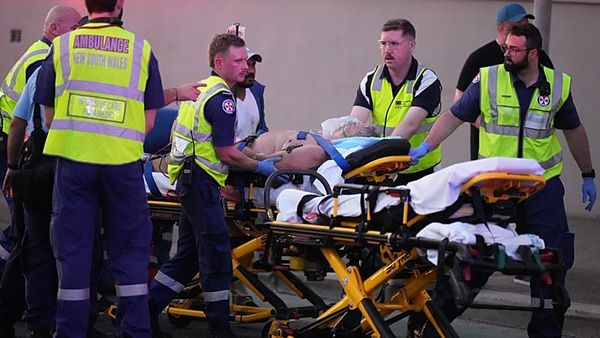The Rafah crossing point between Egypt and Gaza has finally opened to allow in a trickle of aid for the first time in two weeks, after intense negotiations involving the US, Israel, Egypt and the UN.
The shipment of 20 trucks bringing medical supplies, however, offered very limited relief to Gaza’s 2.3 million population, under fire and with barely anything to eat or drink.
Under the US-brokered agreement, only 20 trucks are being allowed in on Saturday, deliveries from the Egyptian Red Crescent to the Palestinian Red Crescent organisation. Aid officials said they were not expecting a delivery on Sunday, with the next consignment due to be a UN convoy on Monday.
The Israeli government has demanded to see proof that the aid deliveries are not seized or diverted by Hamas, before authorising further deliveries. A UN official said on Saturday that “verification procedures are still under discussion”.
Antony Blinken, the US secretary of state, said: “We have been clear: Hamas must not interfere with the provision of this life-saving assistance.” If that happened, he added, then “as a practical matter it will hinder the international community from being able to provide this aid”.
Aid agencies are also negotiating with Israel to allow fuel, essential for hospital generators and Gaza’s water desalination and pumping system, to be part of the humanitarian convoys.
The UN secretary general, António Guterres, told the peace summit in Cairo: “The people of Gaza need a commitment for much, much more – a continuous delivery of aid to Gaza at the scale that is needed.” He called for a humanitarian ceasefire to rescue Gaza from what he described as a “godawful nightmare”.
On Friday, Guterres visited the Rafah crossing where substantial quantities of humanitarian aid were waiting for the green light to cross into Gaza.
“There I saw a paradox – a humanitarian catastrophe playing out in real time,” he said. “On the one hand, I saw hundreds of trucks teeming with food and other essential supplies. On the other hand, we know that just across the border, there are 2 million people – without water, food, fuel, electricity and medicine. Children, mothers, the elderly, the sick. Full trucks on one side, empty stomachs on the other.”
The Egyptian president, Abdel Fatah el-Sisi, said the hastily arranged summit aimed to produce a roadmap for humanitarian relief and to revive hopes of Israeli-Palestinian peace.
The summit, in Cairo’s gleaming and grandiose new administrative centre, was attended mostly by Arab and Europe leaders. There was no Israeli delegation and no senior official from the Biden administration. The US was represented by its chargé d’affaires in Cairo, Beth Jones.
At the summit, the Palestinian Authority president, Mahmoud Abbas, reduced to a bystander in the Israel-Hamas conflict, said Palestinians were being forcibly displaced in both Gaza and the West Bank, where harassment from settlers with security force support is forcing increasing numbers of people off their ancestral land.
“We will never leave our land and we’ll stand tall on our land until the end,” Abbas declared.
Tedros Adhanom Ghebreyesus, the director general of the World Health Organization, said on social media that the medical supplies being sent into Gaza “include trauma and chronic disease medicines, and basic essential medicines”.
He called for the protection of humanitarian teams in Gaza and “sustained humanitarian access”.
Twenty lorryloads of supplies is a tiny proportion of the humanitarian aid that used to cross the Rafah border before the current conflict erupted with a Hamas massacre of Israeli civilians on 7 October. The daily average used to be about 500 trucks a day, aid officials said.
Martin Griffiths, the UN’s head of humanitarian affairs and emergency relief, said: “I am confident that this delivery will be the start of a sustainable effort to provide essential supplies – including food, water, medicine and fuel – to the people of Gaza, in a safe, dependable, unconditional and unimpeded manner.
“Two weeks since the start of hostilities, the humanitarian situation in Gaza – already precarious – has reached catastrophic levels. It is critical that aid reaches people in need wherever they are across Gaza, and at the right scale.”
The planned convoys, under the current agreement with Israel, will not include fuel, which is critical for hospital generators and operating water pumps and desalination plants at a time when the water ration at UN shelters is down to one litre a person a day for all purposes, well below international standards for minimal consumption.
Egyptian and US officials first believed a week ago they had a deal with the Israeli government to open Rafah, but Israel insisted on guarantees that the aid consignments would be thoroughly checked to ensure they consisted only of food, water and medical supplies, and that arrangements would be in place inside Gaza for the aid to be distributed without Hamas involvement.
Joe Biden sealed the agreement during his visit to Tel Aviv on Wednesday but it took another three days for the crossing to open, while Egyptian workers repaired bomb damage to the crossing from the Sinai peninsula into Gaza.
Part of the agreement was for hundreds of Palestinian Americans inside Gaza to be able to leave, but there was no sign by Saturday afternoon that any had been able to cross.
“There is no higher priority than the safety of US citizens abroad, and US embassy Cairo teams are poised to assist these US citizens,” Blinken said.
“We are working tirelessly, including with partner and allied nations with citizens in Gaza, to secure their ability to safely depart the conflict area.”
The ActionAid communications and advocacy coordinator, Riham Jafari, said: “We welcome this morning’s aid convoy into Gaza, but it’s clear that what’s being delivered today is barely a drop in the ocean. Before this crisis began, around 500 aid trucks would normally cross the border every day providing a vital lifeline to millions of Gazans who were already facing a humanitarian crisis.
“Aid trucks also did not bring with them the fuel needed to power hospitals, keep ambulances moving, or to pump water from the ground. We’re hearing stories every day of communities coming together to donate whatever fuel they have remaining to keep incubators going for newborns who are in a critical condition. With 2.2 million Gazans facing a humanitarian crisis, we’re urgently calling for a ceasefire and for the opening of humanitarian corridors.”







